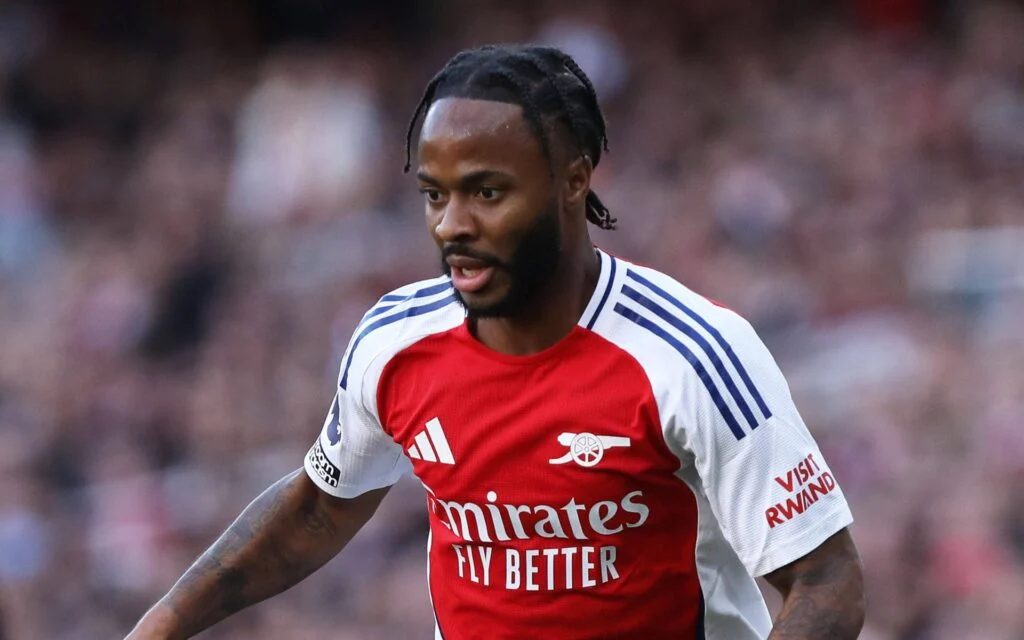Arsenal manager Mikel Arteta appears to be increasingly unconvinced by Raheem Sterling, as questions arise regarding the winger’s performances in training and his lack of game time.
Former Manchester United and Blackburn Rovers chief scout Mick Brown, who remains closely connected within the sport, has shared insights from behind the scenes at Arsenal. According to Brown, concerns have emerged within the club about Sterling’s commitment and consistency in training, a key reason he hasn’t featured more prominently for the Gunners this season.
After joining Arsenal on loan from Chelsea over the summer, Sterling was seen as a potential high-impact player capable of bolstering Arteta’s attacking options. However, despite Arsenal’s ongoing need for consistency on the wings, the 29-year-old’s involvement has been minimal. Premier League loan restrictions prevented Sterling from playing against his parent club, Chelsea, but his absence in other recent matches, including high-stakes fixtures like the Inter Milan and Newcastle defeats, has left fans and analysts puzzled.
Sterling has made only eight appearances across all competitions for Arsenal, with just four of those coming as starts. His most recent significant playing time came in a 90-minute Carabao Cup victory over Preston North End. For Arsenal supporters, however, Sterling’s contributions have not lived up to expectations. After his lackluster performance in Arsenal’s 3-1 victory over Southampton in October, fans on social media were quick to criticize the winger, dubbing him “the worst signing” of Arteta’s tenure.
Advertisement
Latest Press Conference
We’re on Social Media



Brown suggests that Arteta’s strict standards and emphasis on intensity in training are likely factors behind Sterling’s limited minutes. Known for his demand for high standards, Arteta has shown he’s unafraid to bench players who fail to meet his expectations—a stance that, according to Brown, may explain Sterling’s absence in critical matches even amid Arsenal’s offensive struggles.
According to Brown, Arsenal’s choice to bring Sterling in on loan was initially seen as a significant acquisition, especially with Chelsea reportedly covering the majority of the player’s substantial wages. However, Brown notes that Arsenal’s reluctance to play him, even during a period when they need attacking depth, suggests deeper issues at play.
For Arsenal, the Sterling loan seemed like a low-risk, high-reward option at the time. Yet, as the season progresses, the once-lauded addition is turning into a dilemma. Fans have questioned Arteta’s decision to keep Sterling out, especially with Arsenal missing a consistent wide threat. Brown speculates that Sterling’s limited game time could indicate that Arteta’s expectations in training are not being met, which would be in line with the Spaniard’s reputation for valuing intense work ethic and tactical discipline.
Sterling’s stint at Arsenal has not only raised questions about his place in Arteta’s squad but also about his future in English football. Having initially made his mark at Liverpool before rising to prominence at Manchester City, Sterling’s career seemed to reach new heights. However, his recent lack of form and consistency since joining Chelsea and, now, Arsenal has led to debates over whether he can reclaim his top-level standing.
This situation also highlights Arteta’s uncompromising managerial style, as he clearly prioritizes form and fitness in training over status or past achievements. In Arteta’s system, where discipline and tactical adherence are paramount, a player’s reputation matters less than their current contribution. As Brown notes, the fact that Arteta has chosen not to start Sterling despite Arsenal’s injuries and form challenges suggests a gap between what the manager expects and what the winger has shown in training sessions.
If Sterling’s performances don’t improve, Arsenal may be forced to reassess his role as they look to bolster their attacking options further in the January transfer window. For Sterling, regaining Arteta’s trust and proving his value will be crucial in order to salvage his time at Arsenal and perhaps secure a more permanent role in North London.
Arsenal’s long-term vision under Arteta has brought the club considerable success, but players like Sterling, who joined with high expectations, must now meet the club’s demanding standards. Arteta’s approach—prioritizing youth development and consistently strong performances—leaves little room for compromise, even for seasoned internationals like Sterling.
In the weeks to come, all eyes will be on whether Arteta changes his stance, particularly as Arsenal’s campaign continues and squad depth becomes more essential. For now, Sterling remains on the fringes, with his future at Arsenal uncertain as the club’s focus shifts toward maintaining momentum in the league and advancing in European competitions.
